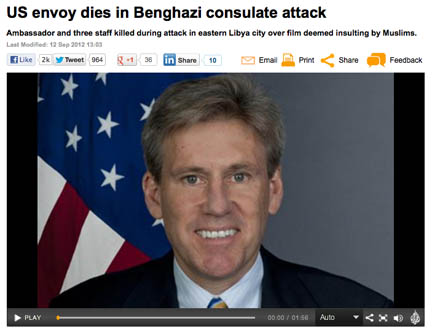
Yesterday was the 11th anniversary of the tragic loss of life on 9/11, the ugly outcome of hate in which people who had personally done nothing to offend the perpetrators lost their lives. Today we awake to hear that the American ambassador to Libya is dead; the American flag at the U.S. embassy in Cairo is torn to shreds. This is the same American diplomat who aided the Libyan revolution against Qaddafi; this is the same flag that is synonymous with the political notion of democracy. In both cases yesterday it was not a response to anything the United States government did or authorized, nor to any military action. A hate film, and a very poorly done one at that, had been posted on the Internet in which Islam and the prophet Muhammad are portrayed in an extremely negative way. The film, an excerpt of which can be seen here, is pathetic both as cinema and for its almost comical portrayal of Muslims. But it has provided an excuse for militants to once again harp on the specter of the United States against the Muslim world.
Were this film from a religious nutcase like Terry Jones, I suspect it would not have garnered as much attention. But it appears that the maker of the film is an Israeli backed by Jewish donors and promoted by an anti-Muslim Copt in California. How perfect is that for a conspiracy plot. Hateful films do not have to be good cinema to fuel hateful responses. But this time it is the role of the Internet that fuels the fire. Anyone can post a malicious film on Youtube and have it circle the globe in an instant. The solution is not to ban the Internet, which is impossible, nor to justify the actions of those who turn their anger into a killing spree. It is not possible to stop a Terry Jones from burning the Quran or any cinematic venom from being posted (at least temporarily), so the onus falls back on our own ethics. We need to think beyond the politics of hate, which have not been unleashed with a fury, to the politics of restraint.